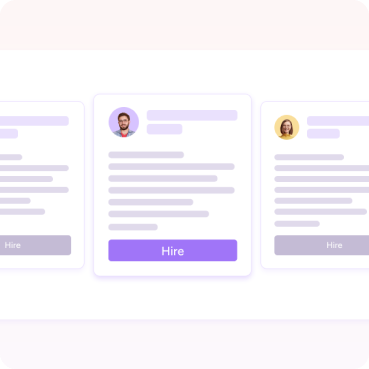Regular hiring
High RiskHire AI Engineers of Silicon Valley caliber
Hire pre-vetted, full-time remote AI Engineers from India. Hire now and build your dream engineering startup team with Hyno.
Join 4,000+ companies already growing








Our Top Remote Developers
Hyno conducts rigorous testing and carefully vets the AI developers fueled by passion and skill sets. Hence, our AI developers community is the foundation for innovation and collaboration, bringing ideas and projects to fruition.
OUR STANDARDS
Hyno vs. Your regular recruitment process.
Find a risk-free, pre-interviewed, startup-ready, remote-ready AI Engineer in less than 2 weeks at 40% less cost.
Parameters
Choose the right for your firm.Time
Fees
Quality
Pre Screening
Remote readiness check
Termination
Failure rate
1 - 4 Months
> $1000
High
Low
Freelancing
High Risk1 - 2 Months
No fee
No
Very high
 Low Risk
Low Risk
0 - 15 Days
No fee
No
Very low
Pricing Starts from $35/hr
Accomplishing everything in just 3 steps
Our technical manager aligns the required skillset and tech stack with our talent pool to help you find the best fit.

Shortlisting candidates
Precise Hiring: Understanding, Gathering, and Shortlisting nittygritty.
-
 We start by thoroughly understanding your unique needs and specifications.
We start by thoroughly understanding your unique needs and specifications.
-
 We align the AI
engineer details with company goals.
We align the AI
engineer details with company goals.
-
 We tailor the
candidate selection to seamlessly integrate with the organization’s vision and
goals.
We tailor the
candidate selection to seamlessly integrate with the organization’s vision and
goals.


Scheduling an Interview
Effortless talent selection: Finding your perfect match
-
 We connect you with the chosen AI Engineers to ensure a personalized experience.
We connect you with the chosen AI Engineers to ensure a personalized experience.
-
 Our rigorous
selection process guarantees that you find AI engineers that align seamlessly with
your requirements.
Our rigorous
selection process guarantees that you find AI engineers that align seamlessly with
your requirements.


Onboarding the talent
Streamlined onboarding for peak performance.
-
 The qualified AI developer integrates smoothly through structured onboarding to
quickly adapt to projects, processes, and team dynamics.
The qualified AI developer integrates smoothly through structured onboarding to
quickly adapt to projects, processes, and team dynamics.
-
 We go beyond
integration to offer ongoing support for a seamless transition to ensure the new
talent exceeds your expectations.
We go beyond
integration to offer ongoing support for a seamless transition to ensure the new
talent exceeds your expectations.


Read hiring guide
A one-stop shop to hiring the right Android Developer
How to hire an AI Engineer? Skills to look for, interview questions, and more
Hiring an AI engineer involves finding a candidate
with the right skills and experience. Start by defining the specific AI-related
tasks and projects they will work on. This could be developing machine learning
models, natural language processing, or computer vision systems.
Create a detailed job description outlining the required technical skills. You can
include skills like proficiency in programming languages like Python or R,
experience with AI frameworks like TensorFlow or PyTorch, and knowledge of data
handling and preprocessing techniques.
Now, use a combination of sourcing strategies, including job boards, professional
networks, and AI-specific communities, to find potential candidates. Assess their
technical capabilities and problem-solving skills through coding tests and project
discussions.
If the process is too daunting, Hyno is here to assist you at every step to make
hiring easier. Finding the right candidate requires a significant amount of
understanding of the domain. However, if you are a non-technical employer, please
contact us to hire an AI engineer.
What are the key skills required to hire an AI Engineer?
An AI Engineer requires the following skills to be efficient at his job:
Programming Proficiency: Strong skills in programming languages commonly used in AI, such as Python, R, and sometimes Java or C++.
Machine Learning and Deep Learning: In-depth understanding of machine learning algorithms, deep learning architectures (like neural networks), and frameworks such as TensorFlow, Keras, and PyTorch.
Data Handling and Preprocessing: Expertise in data manipulation, cleaning, and preprocessing, as well as experience with databases and tools like SQL and NoSQL.
Mathematics and Statistics: Solid foundation in linear algebra, calculus, probability, and statistics to understand and implement AI algorithms effectively.
Model Evaluation and Optimization: Skills in evaluating model performance using metrics like accuracy, precision, recall, and experience with hyperparameter tuning and optimization techniques.
Natural Language Processing (NLP): Knowledge of NLP techniques and tools if the role involves working with text data.
Computer Vision: Understanding computer vision principles and experience with related libraries like OpenCV if the role involves image or video data.
Big Data Technologies: Familiarity with big data tools and platforms like Hadoop, Spark, and distributed computing.
Problem-Solving and Critical Thinking: Ability to analyze complex problems, design solutions, and think critically about various approaches.
Communication and Collaboration: Strong communication skills to explain complex concepts to non-technical stakeholders and collaborate effectively with team members.
What is the ideal hiring process for an AI engineer?
The ideal hiring process for an AI engineer ensures you find the best candidate with the right skills and cultural fit. Here’s a streamlined approach:
Initial Screening: Conduct initial resume screenings to shortlist candidates who meet the basic qualifications. Follow up with a phone or video interview to assess their communication skills, interest in the role, and overall fit.
Technical Assessment: Administer coding tests or technical assessments to evaluate the candidate’s programming proficiency and problem-solving abilities. Use platforms like HackerRank or Codility for standardized tests.
Technical Interviews: Conduct in-depth technical interviews with your team. Assess the candidate’s knowledge of machine learning, data preprocessing, model evaluation, and relevant AI frameworks. Include practical problem-solving scenarios and case studies.
Project-Based Evaluation: Assign a take-home project or a real-world problem to solve. This will evaluate their skills in dealing with practical challenges and their approach to problem-solving.
Behavioral and Cultural Fit Interviews: Assess the candidate’s soft skills, such as teamwork, communication, and adaptability. Conduct interviews with potential team members and stakeholders to gauge cultural fit and collaboration skills.
Reference Checks: Contact references provided by the candidate to verify their past work experience, technical skills, and overall performance in previous roles.
Offer and Negotiation: Extend a job offer to the selected candidate, including details on salary, benefits, and other terms. Negotiate to address the candidate’s expectations and finalize the agreement.
Onboarding: Develop a comprehensive onboarding plan to integrate the new hire into your team. Provide them with the necessary resources, tools, and training to start contributing effectively. This structured process ensures a thorough evaluation of candidates, balancing technical proficiency with cultural fit to hire the ideal AI engineer for your organization.
Important Interview questions to ask to Hire a AI Engineer
What is the importance of activation functions in neural networks?
Activation functions introduce non-linearity, enabling the network to learn complex patterns in data. They capture different patterns and ensure proper gradient flow during backpropagation to update weights effectively. They can also bind outputs to specific ranges and enhance feature learning.
Why do we need data normalization?
Data normalization scales the input features to a similar range, improving the performance and stability of machine learning models. It helps models converge faster during training and ensures that features contribute equally to the result. Additionally, it prevents features with larger ranges from dominating the learning process. Normalization also maintains numerical stability and avoids issues with gradient descent optimization.
Explain data augmentation in short?
Data augmentation increases a training dataset's diversity and size without collecting new data. It applies transformations such as rotations, flips, scaling, cropping, and color adjustments to the existing data. With varied examples, data augmentation improves the generalization capabilities of machine learning models. This is particularly true for tasks like image and speech recognition.
Define Swish function?
The Swish function is smooth and non-monotonic. This means it can produce positive and negative values and has a slight gradient for both significant positive and negative inputs. It performs better than traditional activation functions like ReLU in some deep-learning tasks. This is because it maintains non-linearity while providing a smoother gradient, which helps optimize complex models.
What is the Fuzzy Approximation Theorem?
The Fuzzy Approximation Theorem states that “any continuous function defined on a closed interval can be approximated to any desired degree of accuracy by a fuzzy system.” When using fuzzy logic, it's possible to construct a fuzzy system that can approximate a wide range of functions by adjusting the rules and membership functions. This theorem is useful in modeling complex, non-linear systems and functions, highlighting their flexibility and adaptability in various applications. These applications include control systems, pattern recognition, and decision-making processes.
What machine learning algorithms are you most familiar with and in which scenarios would you use them?
Understanding their knowledge of algorithms and their application is crucial for determining their expertise in solving various problems.
How do you handle and preprocess data for your models?
Data preprocessing is a critical step in AI projects. This question assesses their knowledge of data cleaning, normalization, and augmentation techniques.
Can you discuss a time when you had to tune hyperparameters of a model? What was your approach?
Hyperparameter tuning can significantly affect model performance. This question evaluates their practical experience and strategies for optimization.
How do you stay updated with the latest advancements in AI and machine learning?
The field of AI is rapidly evolving. This question determines if the candidate is committed to continuous learning and staying current with new technologies.
Job Description Template for AI Engineer
Location: [Insert Location]
Job Title: AI Engineer
Position Type: Full-Time
Salary: [Insert Salary Range]
We're seeking a talented and motivated AI Engineer to join our dynamic team. In this role, you'll be at the forefront of developing and implementing state-of-the-art AI and machine learning solutions to solve complex business problems.
Responsibilities:
- Design, develop, and deploy AI models and algorithms
- Work with various teams to define and implement AI-driven solutions
- Optimize existing machine learning models for improved performance and efficiency
- Conduct data analysis and preprocessing to support AI model development
- Stay updated with the latest developments in AI and machine learning technologies
- Be involved with code reviews and emphasize the best practices in AI development
Requirements:
- Bachelor's or Master's degree in Computer Science, Engineering, or a related field
- 3+ years of experience in AI/ML development
- Strong programming skills in Python, with expertise in AI/ML frameworks (e.g., TensorFlow, PyTorch)
- Proficiency in data analysis and statistical modeling
- Experience with deep learning, natural language processing, or computer vision
- Familiarity with cloud platforms (AWS, GCP, or Azure) and MLOps practices
- Excellent problem-solving and communication skills
Preferred Qualifications:
- PhD in Machine Learning, AI, or a related field
- Experience with big data technologies (e.g., Spark, Hadoop)
- Contributions to open-source AI/ML projects
- Publications in peer-reviewed AI/ML conferences or journals
What We Offer:
- Competitive salary and benefits package
- Opportunities for professional growth and learning
- Collaborative and innovative work environment
- Chance to work on cutting-edge AI technologies